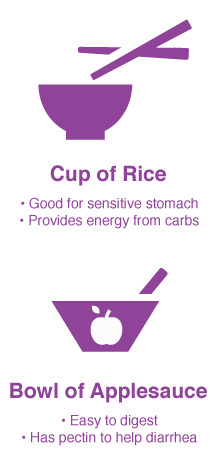http://www.healthline.com/health/cold-flu/best-remedies-stomach-flu#Overview1
Beat the stomach flu blues with these five tips.
Part 1 of 9: Overview
Overview

Nobody likes getting sick, especially when it’s the stomach flu: whether it causes a fever, nausea and/or vomiting, the chills, diarrhea, aches and pains, or some or all of the above, they add up to an awful feeling. While there is no cure for the stomach flu, the remedies below may help provide relief from this condition’s most difficult symptoms.
What are the best natural remedies for an upset stomach? Find out here »
Part 2 of 9: Causes
What Causes the Stomach Flu?
The stomach flu, or gastroenteritis, can be caused by a number of different viruses that attack your gastrointestinal system. These viruses can be contracted from food that was inadequately prepared or from coming into contact with an infected person, especially if you have bad hygiene. Certain bacteria can also cause gastroenteritis. People with the stomach flu often have symptoms of diarrhea, nausea and vomiting, fever, headache, and sore muscles.
What’s helped you recover from the stomach flu?
Depending on the type of infection you have, the flu can last from one to 10 days.
Part 3 of 9: Fluids
1. Drink the Right Fluids
Make sure you are drinking plenty of liquids! Fluids are critically important when you have the stomach flu. If you are having trouble keeping liquids down, try taking small sips at regular intervals or chew ice chips.



Clear liquids, such as water and broth, are best. Older children and adults can also have sports drinks to help with electrolyte replacement during the stomach flu.
What Not To Drink: There’s no reason for caffeinated drinks like coffee, strong black tea, or soda. First, you need to sleep. Second, caffeine can irritate the gastrointestinal lining. Likewise, there’s no need for alcohol, which acts as a diuretic and could upset your stomach more.
Part 4 of 9: Foods
2. Eat The Right Foods
Keeping food down can be difficult with the stomach flu. Don’t force yourself to eat if eating makes you nauseous.



The BRAT Diet consists of four key components: bananas, rice, applesauce, and toast.
These should be your go-to foods when it comes to an uneasy stomach. They’re easy to digest, contain a lot of carbohydrates to give you energy, and replenish nutrients lost through vomiting and diarrhea.
- Bananas: Bananas are easy to digest and can replace the potassium you lose from vomiting and diarrhea.
- Rice: Brown rice has too much fiber, but white rice is easy to digest and provides energy from carbs.
- Applesauce: This is also easy to digest, can provide an energy boost due to the carbs and sugars, and also contains pectin, which can help with diarrhea.
- Toast: Avoid using whole wheat bread, as fiber can be difficult on the digestive system. White bread is very processed and is easier to digest.
What Not to Eat: General food groups to avoid are dairy, fiber-heavy foods, and anything fatty or spicy.



- Dairy: Not everyone has a problem with milk when they have the stomach flu, but it could be hard to digest when your intestinal tract is already irritated.
- Fiber: Fiber can make an already sore gastrointestinal tract work hard, which can cause pain and discomfort.
- Fatty Foods: Avoid greasy and salty foods like bacon. These can increase nausea by keeping food in the stomach longer
- Spicy Foods: Avoid acidic foods like tomato sauce and spicy foods like curries and chili sauces. They can irritate an already irritated system and will certainly not feel good if you are not finished vomiting.
Part 5 of 9: Acupressure
3. Acupressure
Acupressure has been shown to be effective in some types of nausea.
The Memorial Sloan-Kettering Cancer Center suggests finding pressure point P-6 by applying pressure to the area located three fingers down from the bottom of your palm. Press below that width with your thumb and you’ll feel a sensitive spot between two tendons. Gently massage that spot with your thumb for two or three minutes.
Part 6 of 9: Rest
4. Rest
If you have the stomach flu, your body needs rest in order to fight off the virus. You’ll need to get plenty of sleep and reduce the amount of activity you normally do during the day. This means lounging on the couch when you’re not in bed.
Remember, you’re not being lazy — while you’re lying down, your body is working hard to fight off the virus and repair any damage on the cellular level.
Part 7 of 9: Medications
5. Medications
You can take medication when you have the stomach flu, but you should do so sparingly. If you have a fever, headache, or muscle aches, ibuprofen can help, as long as it doesn’t cause you to have more of an upset stomach. Taking it sparingly with food is usually the best approach.
Acetaminophen (Tylenol) is usually recommended for stomach flu, unless you have liver disease. Avoid taking aspirin.
If you are seeking relief from nausea or diarrhea, there are some prescription medications that can ease your symptoms. Your doctor may prescribe an anti-emetic, such as promethazine, prochlorperazine, or metoclopramide, to stop the nausea and vomiting if it is excessive.
You can also try an over-the-counter antidiarrheal medication, such as loperamide hydrochloride (Imodium) or bismuth subsalicylate (Pepto-Bismol), to alleviate your diarrhea. Check with your doctor before you try any over-the-counter medications.
Part 8 of 9: Spread
Is Stomach Flu Contagious?
A virus is the most common cause of stomach flu or gastroenteritis. The most common viruses are rotavirus or norovirus. Symptoms appear one to three days after exposure to the virus. You are contagious before you even begin to develop symptoms.
Even after you’ve recovered, you can remain contagious for up to two weeks. Children can remain contagious for an even longer period afterwards. There are vaccines available for some forms of rotavirus. If possible, avoid close contact with infected people. Do not share food with infected people, and wash hands frequently.
Part 9 of 9: Prevention
Preventing the Stomach Flu
Having the stomach flu can make you feel miserable. If you do get it, these remedies can help reduce some of the misery. As the old saying goes, an ounce of prevention is worth a pound of cure. Some basic ways to avoid getting the stomach flu (and illness in general) include washing your hands regularly and getting plenty of rest.